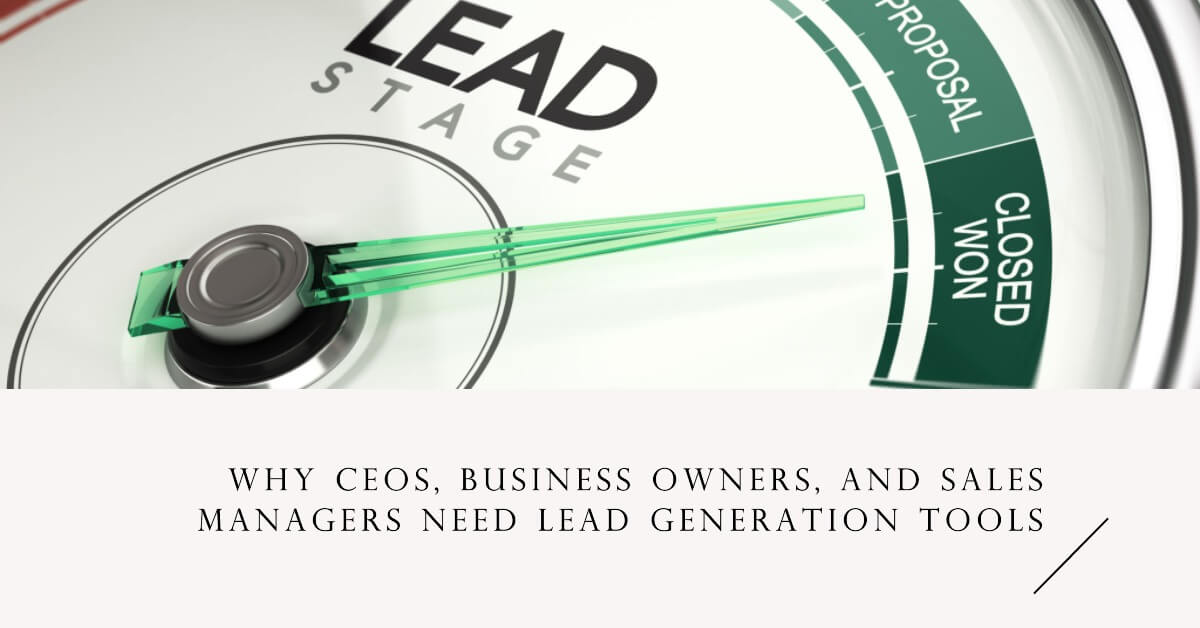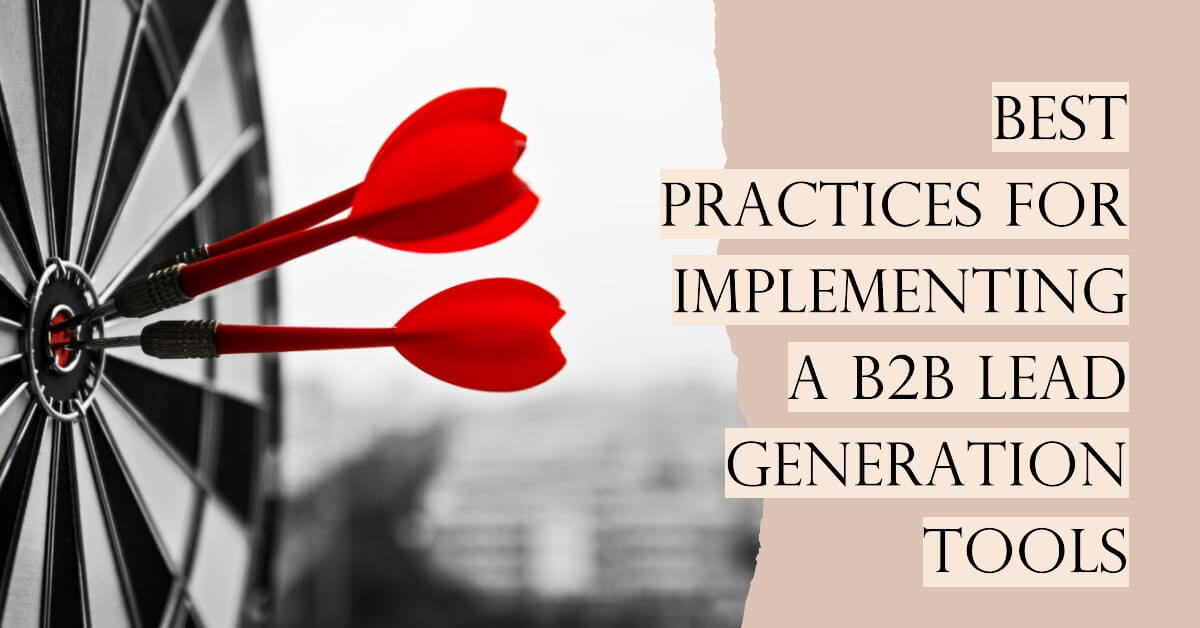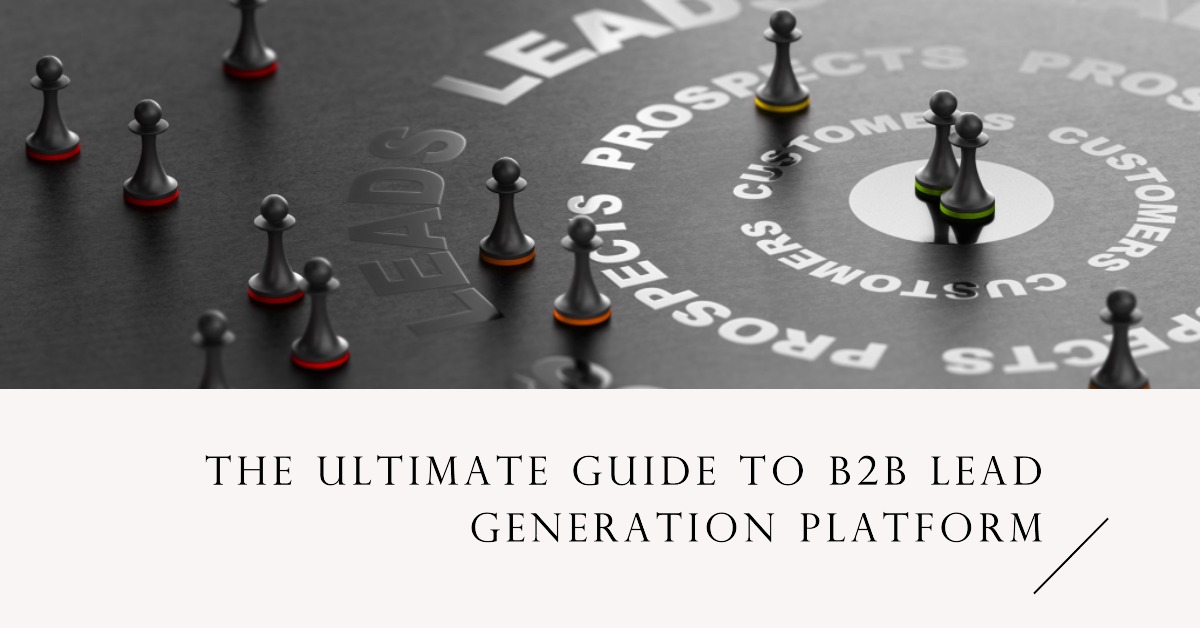Introduction
B2B lead generation is the process of identifying potential customers and nurturing them until they become actual customers of your business. It is an essential aspect of marketing and sales, especially for businesses that are looking to grow their customer base. Many B2B companies struggle with generating high-quality leads consistently, which is where a B2B lead generation platform comes in.
A B2B lead generation tool that helps businesses automate the process of finding, qualifying, and nurturing leads. It enables marketing teams to attract potential clients using different channels such as email marketing, Google Ads, LinkedIn Ads, and content marketing.
These platforms come with various features such as lead capture forms, landing pages builders, email templates, CRM integration tools and analytics tools like Google Analytics. CEOs, business owners and sales managers need a lead generation platform for several reasons.
First of all, it helps them build a predictable pipeline of high-quality leads that their sales team can close deals with. Second, it allows them to focus on other areas of their business by automating the time-consuming task of finding new prospects.
It provides actionable insights into what’s working and what’s not in their lead generation funnel so that they can continuously optimize for better results. When choosing a generation tool for your small business or enterprise-level company there are some top features you should look out for: Firstly consider if it has integration tools like Zoho CRM or Salesforce where you can manage your contacts in one central location.
Secondly look at automation tools where you can set up rules based on user interactions to nurture leads automatically during different stages of buyer journey which will save time and effort from manually doing it individually when dealing with each prospect from various channels like websites or social media platforms. Furthermore having access to analytics reports within the platform will enable you to track metrics such as email open rates conversion rates etc., this will give insight into what works and what isn’t allowing your marketing team to adjust their approach for better results.
The platform should provide support channels where you can reach out to experts who can help guide you through any issues or challenges that arise. A generation tool is an essential tool for any business looking to grow its customer base.
It enables marketing teams to attract potential clients using various channels while providing actionable insights into what’s working and what’s not in their lead generation funnel. Make sure the platform you choose has integration tools, automation features, analytics reporting and support channels so you can get the most value out of your investment.

Why CEOs, Business Owners, and Sales Managers Need Lead Generation Tools
Generating leads is the foundation of any successful business, especially in the B2B space.
With an ever-increasing number of businesses competing for potential customers’ attention, it’s necessary to have a robust lead generation strategy in place. Lead generation tools provide a comprehensive solution for generating and managing leads effectively.
One of the primary reasons why CEOs, business owners, and sales managers need a b2b lead generation platform is to generate more qualified leads. Qualified leads are potential customers who are interested in your product or service and have a higher chance of converting into paying customers.
A good platform helps you identify potential leads based on specific criteria such as company size, industry type or location. A lead generation platform is especially useful for businesses that want to scale their operations quickly.
Without an effective way to generate leads consistently, it can be challenging to expand your customer base or increase revenue. The right tool can help you streamline your marketing campaign and generate qualified leads at scale.
Another reason why businesses need lead gen is that it helps you save time and resources. Instead of manually researching potential customers or relying on outdated methods like cold calling or email marketing campaigns with low open rates, these tools automate many aspects of the process allowing you more time to focus on other critical tasks.
Good generation companies should also help you with lead nurturing, which involves building relationships with potential customers over time by providing valuable content that helps them understand how your product or service can solve their problems. Having access to comprehensive analytics through platforms like Hubspot Marketing Hub, Zoho CRM or Google Ads enables sales teams with insights/knowledge they need about each prospect’s intent before reaching out so they can craft appropriate messaging when initiating contact using tools such as Sales Navigator for LinkedIn connections.
A lead generation platform is essential for businesses looking to generate more leads, increase revenue and ultimately grow. With a variety of tools and features available, it’s important to choose the right one that suits your business needs and budget.

Top Features to Look for in a Lead Generation Tool
When it comes to selecting a lead generation platform, there are many factors to consider.
With so many options available in the market, it can be overwhelming to determine which features are necessary and which are not. In this section, we will discuss the top features that you should look for when evaluating a lead generation platform.
1. Lead Generation Tools: One of the most important features of a lead generation platform is its ability to generate leads. The platform should have inbound lead generation tools that allow you to identify potential leads and capture their contact information.
This can include features such as web forms, landing pages, and pop-ups that encourage visitors to provide their contact information in exchange for something of value such as an eBook or whitepaper.
2. Lead Nurturing: Once you have captured potential leads, it’s crucial to engage with them on an ongoing basis until they become a qualified lead ready for sales reps’ attention.
A good lead generation platform should provide tools for automating email campaigns and other types of marketing outreach with personalized content.
3. Integration with CRM Tools: Your lead generation platform should seamlessly integrate with your existing CRM tools such as Zoho CRM or Salesforce so that your sales team can access all the pertinent data they need within one system.
This saves time and ensures that everyone is on the same page regarding leads’ status and progress.
4. Campaign Management: A good lead generation platform should also give you complete control over your marketing campaigns’ management across multiple channels, including Google Ads, LinkedIn Ads, social media platforms like Facebook or Twitter, email campaigns and more while monitoring ad spends via Google Analytics.
5. Reporting Capabilities: Finally, your B2B lead generation solution must enable you access comprehensive reporting capabilities so you can track campaign performance metrics (e.g., conversion rates) and gain insights into the effectiveness of specific lead generation campaigns. Detailed reports will help you adjust your strategy and continually refine your process for optimal results.
Selecting a B2B lead generation platform to suit your organization’s unique needs can be daunting. However, by assessing each platform’s features carefully, you can make an informed decision that aligns with your business objectives and maximizes the return on investment (ROI) for your marketing dollars spent.

B2B Lead Generation Strategies for Success
Generating leads is the lifeblood of any b2b marketer.
But the question is, how to generate quality leads? In this section, we will discuss some effective B2B lead generation strategies to achieve success.
1. Research potential customers: Before starting any lead generation campaign, researching potential customers is essential. It will help you identify your target audience and what they need from your business.
You can conduct surveys, analyze competitors’ strategies, and use data from social media platforms to get insights into your potential customers.
2. Use LinkedIn Ads: LinkedIn is an excellent platform for b2b marketers as it has a large user base of professionals looking for solutions to their business problems.
LinkedIn ads allow you to target specific job titles or industries, making it easier for your marketing team to reach out to decision-makers in those areas.
3. Optimize Landing Pages: Your landing page plays a crucial role in converting visitors into leads.
Ensure that your landing page has a clear message that resonates with your target audience and a prominent call-to-action (CTA) that encourages visitors to fill out their details.
4. Leverage Marketing Automation: Marketing automation tools like Zoho CRM or Sales Navigator allows sales teams and marketers automate repetitive tasks like follow-up emails, social media postings and lead scoring so they can focus on nurturing relationships with qualified leads that show interest in their products or services.
5. Create Valuable Content: Creating useful content helps attract potential customers by positioning yourself as an expert in your industry while providing helpful advice on topics related to their interests . You can create blogs, eBooks whitepapers or webinars providing valuable insights on industry trends and case studies showcasing clients successes.
Implementing these B2B lead generation strategies can help improve efficiency while generating quality leads for small businesses looking to grow their customer base effectively . By researching potential customers using tools such as LinkedIn Ads; optimizing landing pages for conversions; leveraging marketing automation to automate repetitive tasks and following up with valuable content, businesses can position themselves well within their industry and establish brand authority.

Case Studies: Successful B2B Lead Generation Campaigns
Case studies are a great way to learn about successful campaigns and understand the strategies that brought success. Here are some case studies that showcase effective B2B lead generation campaigns:
1. HubSpot Marketing Hub HubSpot Marketing Hub is a widely used software platform for inbound marketing, sales, and customer service.
The company implemented its own marketing strategy to generate leads for its sales team using their own tools. They used a mix of content marketing, email campaigns, social media, and search engine optimization (SEO) to generate traffic to the website, which then converted to leads using lead magnets such as ebooks, webinars, and whitepapers.
The results were impressive – 300% increase in qualified leads over a 10-month period. The success of this campaign was attributed to using their own tools effectively and creating compelling content that resonates with their target audience.
2. Sales Navigator LinkedIn’s Sales Navigator is another popular tool for sales teams to generate high-quality B2B leads.
An example of its effectiveness can be seen in LinkedIn’s own case study on how they used their Sales Navigator tool to generate leads for their Talent Solutions business unit. They used an outbound lead generation strategy by reaching out to potential customers through targeted messages and InMail campaigns.
They also leveraged account-based marketing (ABM) tactics by focusing on specific companies with high potential value and customizing outreach efforts accordingly. The results were remarkable – the campaign resulted in over $5 million in new business revenue within six months.
3. Lead Forensics Lead Forensics is a B2B lead generation company that offers software designed to identify anonymous website visitors and convert them into actionable leads.
A case study on how they helped one client improve their lead generation efforts showcases the power of utilizing such technology. The client had been struggling with generating quality leads through traditional methods such as trade shows and email campaigns.
They implemented Lead Forensics, which helped them identify anonymous website visitors and provided detailed information on their browsing behavior. The client was able to reach out to those potential leads with more targeted messaging, resulting in a 70% increase in quality leads generated.
4. ZoomInfo ZoomInfo is a B2B database company that provides access to comprehensive contact information for companies and their decision-makers.
A case study on how they helped an IT services company showcases the effectiveness of using data-driven insights to fuel lead generation. The company had been relying on outbound lead generation tactics such as cold calling and email campaigns, but were struggling with low response rates.
They implemented ZoomInfo, which allowed them to access up-to-date contact information for their target audience and create more personalized messaging. The results were impressive – the company saw a 300% increase in meetings booked within three months of implementing ZoomInfo’s data-driven approach.
5. Outreach.io Outreach.io is a sales engagement platform that helps sales teams manage their outreach efforts at scale.
A case study on how they helped one B2B marketer improve their lead generation shows the power of utilizing technology to streamline outreach efforts. The marketer had been relying on manual processes such as manually sending emails and tracking responses in spreadsheets.
They implemented Outreach.io, which allowed them to automate outreach efforts and track engagement with prospects at scale. The results were astounding – they saw a 40% increase in qualified leads generated within six months of implementing Outreach.io’s sales engagement platform.
Once you’ve generated quality leads, the next step is to set appointments effectively. Our B2B Appointments Setting with Hot Leads service can assist you in this crucial phase, ensuring you connect with your potential customers at the right time and move them further down the sales funnel.

Best Practices for Implementing a B2B Lead Generation Tools
Implementing a lead generation tool is an important aspect of any business’s growth strategy.
However, it is not enough to simply select a platform and start generating leads. Companies need to follow best practices when implementing a lead generation platform to ensure that the platform is effective in generating leads that will convert into sales.
One of the first best practices to consider when implementing a lead generation tool is to define your target audience clearly. This includes identifying the key decision-makers within your target market and their pain points.
Understanding this information will help you tailor your marketing efforts and messaging to be more effective at capturing potential leads. Additionally, by focusing on your target audience, you can make more informed decisions about which channels and tactics are most likely to reach them.
Another critical best practice for implementing a B2B lead generation platform is creating an effective lead nurturing strategy. This involves identifying where potential leads are in their buying journey and providing them with personalized content that addresses their specific needs and interests.
For example, if someone has downloaded an eBook on email marketing, you can tailor subsequent emails with content related to email marketing tips or benefits of using an email marketing tool. When it comes to selecting channels for generating leads, businesses should consider using multiple approaches rather than relying solely on one channel such as LinkedIn ads or email marketing campaigns.
By diversifying your approach, you can reach more potential customers who may respond differently based on which channel they prefer. Moreover, it’s essential to train sales reps properly on how to use the B2B lead generation tool correctly – especially if they’ll be handling high-quality inbound leads generated by the software itself or through any b2b lead generation company hired for the purpose.
They must have access promptly when new qualified leads come in from any of these sources so that they can engage prospects as quickly as possible before they lose interest in your product. Businesses should regularly analyze data from the B2B lead generation software to evaluate the effectiveness of their lead generation strategies and tactics.
This could include examining conversion rates, click-through rates, and other metrics that can help you fine-tune your approach for better results. Implementing a B2B lead generation platform is an essential part of any business’s growth strategy.
By following best practices like creating an effective lead nurturing strategy, diversifying your channels, training sales reps properly, and regularly analyzing data, companies can increase their chances of generating high-quality leads that will convert into more significant sales opportunities. Furthermore, with the help of tools like HubSpot Marketing Hub or Lead Forensics – among other leading b2b lead generation software – businesses can take advantage of comprehensive features to make their campaigns more effective in generating leads.
Conclusion
A B2B lead generation platform is an essential tool for any business looking to grow their customer base and increase revenue. By using the top features of a B2B lead generation platform, including advanced targeting and segmentation capabilities, automated email campaigns, and real-time analytics, b2b marketers can generate quality leads more efficiently than ever before.
It’s important to note that implementing a successful lead generation strategy takes time and effort. Businesses must focus on providing value to potential customers through content marketing and personalized outreach efforts.
By leveraging the power of social media platforms like LinkedIn Sales Navigator and Google Ads, businesses can reach their target audience with precision and accuracy. For small businesses that may not have the resources for an in-house team or expensive lead generation software, there are still plenty of affordable options available.
Using a free or low-cost lead gen tool like Zoho CRM or Hubspot Marketing Hub can be just as effective when combined with the right strategies. At the end of the day, generating qualified leads is all about providing value to potential customers.
By understanding their pain points and tailoring your approach based on their needs, you’ll be able to build relationships that result in long-term partnerships. In today’s competitive landscape, businesses cannot afford to overlook the importance of implementing an effective b2b lead generation strategy.
Whether you’re a startup or an established company looking to expand your reach, investing in the right tools and tactics will pay dividends over time. So don’t wait any longer – start generating quality leads today!
As we’ve discussed, implementing an effective B2B lead generation strategy can be complex and time-consuming. If you’re looking for a simpler solution, consider exploring our Lead Generation Made Easy service. It’s designed to streamline the process, helping businesses generate quality leads efficiently and effectively.
Sources:
- HubSpot Marketing Hub: HubSpot website
- Sales Navigator: LinkedIn website
- Lead Forensics: Lead Forensics website
- ZoomInfo: ZoomInfo website
- Outreach.io: Outreach.io website





